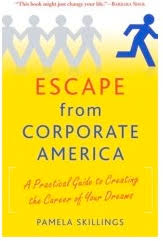Since one of the best aspects of Pamela Skillings’ Escape from Corporate America is its stories of people who successfully escaped, I’m running my review of the book that appeared on A Storied Career’s parent site, Quintessential Careers.
Escape from Corporate America: A Practical Guide to Creating the Career of Your Dreams,
by Pamela Skillings, $15. Paperback. 352 pages, 2008, Ballantine Books; ISBN: 0345499743
The most appealing aspect of Pamela Skillings’ Escape from Corporate America — and the one that gives it the most credibility — is the fact that she interviewed more than 200 people who successfully escaped from jobs in big corporations that no longer suited them.
Not only does Skillings tell the stories of many of these escapees, but
she also lists them in the back of the book. The vast majority have Web sites,
thus providing the opportunity to learn more about these folks or perhaps
even contact them.
Escape is quite comprehensive, covering the full gamut of escape routes —
changing jobs into corporations that are known for being employee-friendly, cutting back to part-time/flex-time, telecommuting, taking time off (such as a sabbatical), joining a smaller company; working as a solopreneur; starting a business that’s more then a solo enterprise, working to make a difference in a job or organization dedicated to the greater good, and following creative passions in such areas as music, acting, writing, filmmaking, and art.
Skillings also spends a good chunk of the book helping the reader determine if he or she truly needs and is ready for an escape from corporate life.
She even offers a quiz to help readers determine if it’s time to get out. The book is full of reader-friendly tidbits, quotes, lists, resources, and stories in sidebars. A Timeline of Corporate Malaise (beginning in 1298 with the founding of the world’s oldest surviving business corporation — Sweden’s Stora Kopperberg) is revealing. The author’s Financial Planning Worksheets for Career Changers seem quite comprehensive and are bound to be more than helpful to the reader considering transcending the rat race.
Skillings also injects the volume copiously with humor, such as including music playlists for miserable cubicle dwellers (“Back on the Chain Gang,” for example) and those fantasizing about leaving (“Take This Job and Shove It,” naturally).
Here are the Top 10 Things I learned from reading Escape from Corporate America:
1. Studies show 50 percent of workers are dissatisfied with their jobs, and 80 percent fantasize about quitting; however, those in corporate jobs are more miserable than workers in smaller companies, who are more miserable than free agents and entrepreneurs.
2. The phases of corporate disillusionment that Skillings describes
are not too different from Elisabeth Kubler-Ross’ well-known stages of grief when people are told they are terminally ill:
- Honeymoon phase (no counterpart in Kubler-Ross’ model)
- Denial (same in Kubler-Ross’ model)
- Bitching (anger in Kubler-Ross’ model)
- Bargaining (same)
- Depression (same)
- Acceptance or Change (happily, you can make
a change if you’re miserable in a corporate career — unlike the
inevitable outcome in Kubler-Ross’ model.)
3. Money is surprisingly unimportant to life satisfaction, Skillings reports, citing a study in which moving from the bottom to the top of the income scale increased overall satisfaction of participants by only about 10 percent.
4. Americans get the skimpiest vacations of all industrialized nations — 8.1 days a year after 10 years on the job.
5. Skillings’ three-step plan for determining one’s perfect career is compact and nifty: (1) Identify your career fantasy; (2) Conduct detective work; and (3) Try on your dream job. She also provides handy worksheets for these endeavors. While I love the fact that she mentions picking the brains of people in the jobs you are considering, I wish she had more explicitly discussed the relatively unknown and underused informational-interview technique. Informational interviews are also helpful in the detective-work phase.
6. While it’s easy to find lists of great companies to work for, the best source is the stories you can solicit from people who’ve been in those companies. Patterns emerged among the tales of the folks Skillings interviewed about the criteria that make an employer terrific to work for: fair treatment, attention to work-life balance, an entrepreneurial culture, learning and growth opportunities, the chance to make a difference, good management, and the people.
7. Astonishingly, 75 percent of businesses are run by self-employed individuals with no employees. Skillings offers a rich collection of ideas for would-be solopreneurs.
8. In even more good news for those considering going out on their own, Skillings cites a stat from the World Future Society that between now and 2012, the fastest-growing field is estimated to be professional and business services.
9. The fact that group health insurance and other health-care solutions are available for prospective solopreneurs who would otherwise be terrified to give up their corporate health benefits should be welcome news. Skillings offers several ideas and resources for coverage.
10. Because QuintCareers has heard from so many teachers who want to get out of teaching, I was surprised that Skillings cites of 69 percent job satisfaction among teachers. Teaching is one of the make-a-difference jobs that Skillings discusses.
Final thoughts
Skillings’ highly readable book is a must for anyone thinking about alternatives to the corporate life. One of the most useful features is the Escape Tool Kit at the back of the book that provides numerous resources for those considering an escape. Skillings also invites escapees to submit their stories.
